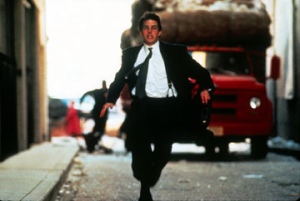I got a chance to watch The Firm for the first time since before I started law school, and I have to say, I loved it even more than before (which was a lot). The pedigree of talent that went into movie is unmatched. Gene Hackman, Tom Cruise and Ed Harris are at the top of their game, and no one built suspense like Sydney Pollack.
And nobody tops Gary Busey, the P.I. that Tom Cruise hires to investigate why young lawyers are dying in disproportionate numbers at his firm. When the firm’s henchmen ask Busey who’s asking questions about dead lawyers, Busey gives them the only logical answer before firing away: “His name was…JULIO IGLESIAS!”
But The Firm had so much more meaning to me as I near the third and final year of law school.
Many of us law students went into our first year hoping to change the world in a positive way. We were the real-life Mitchell McDeeres (Tom Cruise) – idealists. We may have had an idea about what we wanted out of law school and, eventually, a legal career. But law school has convinced us that the big firm jobs – the ones paying $160k – are the jobs we want.
The idea of “selling out” is more complex than it seems. The question is whether law school tends to drain the idealism out of young students, or whether it infuses students with some much-needed pragmatism. A lot of kids go to law school straight from college because there’s nothing else to do. Others found their limited experience in the working world to be less-than spectacular and, as a result, applied to law school without any contemplation of what a legal career might entail. With law school they can be at once practical and indecisive. It’s a delay tactic. That’s not to say there aren’t others who always knew they wanted to go to law school, who knew what they were getting into, and have succeeded in going down the path they had envisioned for themselves. Unfortunately, there aren’t as many of those people as there should be.
For a lot of these kids (I consider myself to be one of them, at least in part), a little pragmatism is welcome. You have to pay your bills. But is a 90-hour work week really what they want? I’m not sure that’s why they came to law school.
In The Firm, Gene Hackman’s character is a shell of his former self, a lawyer who came to the firm with good intentions but allowed the culture of the firm to control him. He was Mitchell McDeere in his previous life (which is why we find Maggie McDeere to be sympathetic toward him in the end, perhaps a little too much). But not only did he succumb to the will of the firm, he became a key component of the firm’s improprieties.
Mitchell McDeere wins in the end – the film explains that he managed to do so without breaking the law. The crux of the film, however, is based on the principle that Mitchell wins his life back. He doesn’t belong to the firm and he doesn’t belong to the government. He becomes a virtuous man again. And guess what? He’s off to work for a small firm in Boston. Unlike big firms that pay a lot, small firms are not EVIL.
How ideal is it to be practical? How practical is it to be ideal? Where is the balance to be struck? As I enter a year filled with on-campus interviewing (big firms), informational interviewing (small and medium-sized firms), and an all-purpose scrounge for employment (anybody, please!), my goal is to remember what I want out of a profession. And for that, I turn to Father Boyle, founder of Homeboy Industries in East Los Angeles, who said, “It’s not about success. It’s about having faith in what you’re doing.”


